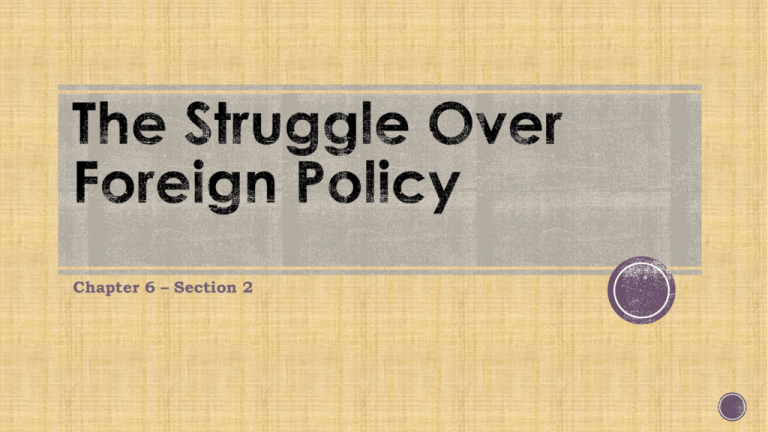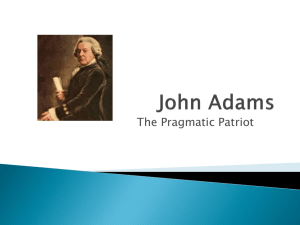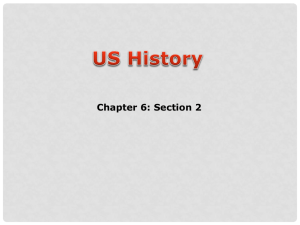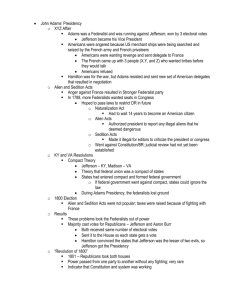The Struggle Over Foreign Policy
advertisement

Chapter 6 – Section 2 The British attempt to limit American settlement in the Northwest Territory the British kept their forts on the American side of the Great Lakes provided arms and ammunition to the Miami Indians and their allies, actively resisted American expansion into their lands. 1790 - chief Little Turtle defeated a small force of American fighters to stop attacks against settlers. 1791 - Little Turtle defeated a larger American force commanded by General Arthur St. Clair. August 1794 federal troops led by General Anthony Wayne defeated the Native American confederacy at the Battle of Fallen Timbers, Wayne’s decisive victory forced the Native Americans to accept his peace terms. Treaty of Greenville, Native American leaders gave up most of the present state of Ohio to the U.S. government. French Revolution - 1789 1789 - saw the French as fellow republicans in a hostile world of aristocrats and kings. 1793 - leaders of the French Revolution began executing thousands of opponents, including the French king and his family. In response, Americans divided along party lines. The Democratic Republicans regretted the executions but preferred the French Republic to monarchy. Jefferson regarded the French Revolution as “the most sacred cause that ever man was engaged in.” The Federalists Regarded French revolutionaries were bloody anarchists out to destroy religion and social order. They suspected that the Democratic Republicans meant to do the same. 1793 - Britain and France at war. Both American political parties agreed The United States was too weak to get involved in the war too dependent on trade with Britain provided nearly 90 percent of American imports. trade generated most of the federal revenue, primarily from tariffs and excise taxes. Americans feared entering the conflict bankrupting the federal government. 1793, President Washington issued a proclamation of American neutrality The British tested that neutrality by seizing American ships trading with the French colonies in the West Indies. American outrage the Jay Treaty of 1794 To avoid war with Britain, Washington sent Chief Justice John Jay to London to negotiate a compromise with the British. the British gave up their forts on American soil, kept most of their restrictions on American ships. required Americans to repay prewar debts to the British. Political Parties Disagree Washington and the Federalists favored this compromise, Democratic Republicans denounced the Treaty as a sellout. After a heated debate, the Senate narrowly ratified the treaty, keeping the peace. In 1795 - Pinckney’s Treaty with Spain. American settlers needed to move their goods down the Mississippi River to New Orleans, where they could be shipped to markets in the East. To ensure a free flow of trade and free shipping rights for Americans also established the northern boundary of Spanish Florida. 1792 - Washington reelected without opposition 1796 – Washington did not run again Poor health, Desired the escape of the political turmoil He also recognized the importance of setting the example of walking away from power Washington retired with a record of astounding achievements. defeated the Indians on the frontier the western lands opened to settlement the Whiskey rebels suppressed kept the nation out of the war in Europe booming foreign trade boosted tariffs funded the government and the national debt. 1796 President Washington decided to retire after serving 2 terms (established 2-term tradition for presidents, "silent law") His Farewell Address was never delivered orally, but it was printed in newspapers. Washington strongly advised against "permanent alliances" like the Franco- American Treaty of 1778 (that was still in effect). He favored "temporary alliances" in the case of emergencies - this would keep the weak nation together (and out of war!) Significance: Washington warned against political parties and promoted neutrality, 2 things that would be broken in the future. Washington set a precedent for keeping a strong national government, promoting patriotism, and keeping morality in the government. Praises the benefits of the federal government. "The unity of government...is a main pillar in the edifice of your real independence...of your tranquility at home, your peace abroad; of your safety; of your prosperity; of that very liberty which you so highly prize.“ Warns against the party system. "It serves to distract the Public Councils, and enfeeble the Public Administration....agitates the Community with illfounded jealousies and false alarms; kindles the animosity of one....against another....it opens the door to foreign influence and corruption...thus the policy and the will of one country are subjected to the policy and will of another." Stresses the importance of religion and morality. "Where is the security for property, for reputation, for life, if the sense of religious obligation desert the oaths, which are the instruments of investigation in Courts of Justice?" On stable public credit. "...cherish public credit. One method of preserving it is to use it as sparingly as possible...avoiding likewise the accumulation of debt....it is essential that you...bear in mind, that towards the payments of debts there must be Revenue, that to have Revenue there must be taxes; that no taxes can be devised, which are not...inconvenient and unpleasant..." Warns against permanent foreign alliances. "It is our true policy to steer clear of permanent alliances with any portion of the foreign world..." On an over-powerful military establishment. "...avoid the necessity of those overgrown military establishments, which, under any form of government, are inauspicious to liberty, and which are to be regarded as particularly hostile to Republican Liberty." A French crisis briefly unified the nation. The Jay Treaty of 1794 had offended the French betrayal of their 1778 treaty of alliance with the United States. XYZ Affair, 1796 - the French began seizing American merchant ships Adams sent envoys to Paris to negotiate peace. three French officials—known in code as X, Y, and Z demanded humiliating terms including $250,000 in bribes Adams broke off negotiations. roused public sentiment against France 1798 - the Federalist majority in Congress expanded the army authorized a small navy surprising victories over French warships To pay for the expanded military, Congress imposed unpopular taxes on stamps and land. 1798 - The Federalists exploited the war fever The Alien Act authorized the President to arrest and deport immigrants who criticized the federal government most immigrants supported the Democratic Republicans, the Federalists made it difficult for them to become citizens The Sedition Act made it a crime for citizens to publicly discredit the federal government criticism undermined trust in the government the Federalists used this act to silence Democratic Republican opposition The Sedition Act allowed juries to acquit defendants who could prove the literal truth of their statements put the burden of proof on the defendants, reversing the tradition of presuming someone innocent until proven guilty ten men of convicted sedition Two state legislatures passed controversial resolves in response to the acts. Democratic Republican states Written by Jefferson and Madison in 1798 and 1799, the Virginia and Kentucky resolutions declared the Sedition Act unconstitutional. The resolves even hinted that states had the power to nullify federal laws that were unconstitutional. Though this doctrine of nullification threatened to dissolve the union, no other state legislatures adopted it. Instead, the presidential election of 1800 would decide the balance of federal power and states’ rights. The Sedition Act and the new federal taxes had become very unpopular 1799 Adams had suspended expansion of the army and sent new diplomats to France Adams lost the heated election to Jefferson. • Thomas Jefferson • Aaron Burr • John Adams 73 electoral votes 73 electoral votes 65 electoral votes The peaceful transfer of power from one party to another set a valuable precedent. To avoid another electoral crisis, in 1804 the Constitution was amended to require electors to vote separately for President and Vice President. (12th Amendment) In the H of Reps Most of the majority political party is the Federalists: They refuse to vote for TJ They pick Burr just because they hate Thomas Jefferson The Democratic-Republican’s make up the rest They vote for Jefferson What happens? It’s a tie vote 30 straight times… Then, it gets weird…. • Because he hated Aaron Burr so much… – He got the Federalists to not vote at all • That way Jefferson could win! – Becomes 3rd POTUS • Aaron Burr is furious – He becomes VPOTUS – Because of this…. » Aaron Burr and Hamilton will be lifelong enemies… Until one shoots the other. The Duel at Dawn…July 11, 1804 Rules of duel: They will march off 10 paces They will turn and present arms On command, they will fire at each other If they both miss, you repeat… Hamilton shoots the tree next to Burr Burr shoots Hamilton in the chest He dies the next day With his death and John Adams retirement The Federalist party ends. Aaron Burr challenges Hamilton to the duel They are to meet in New Jersey Rules of duel: They will march off 10 paces They will turn and present arms On command, they will fire at each other If they both miss, you repeat…







